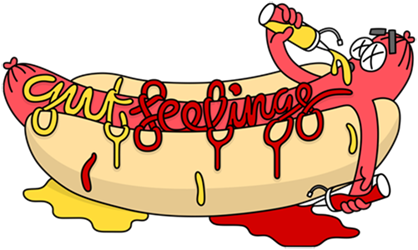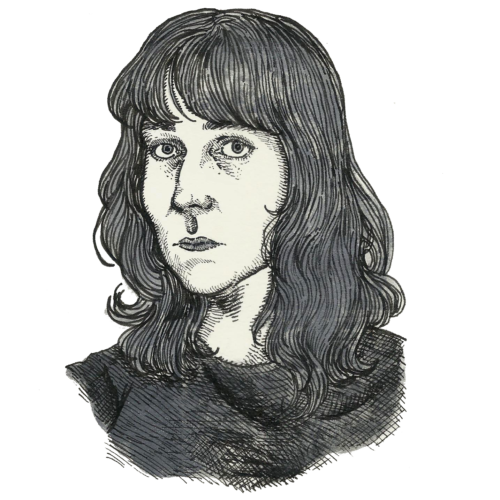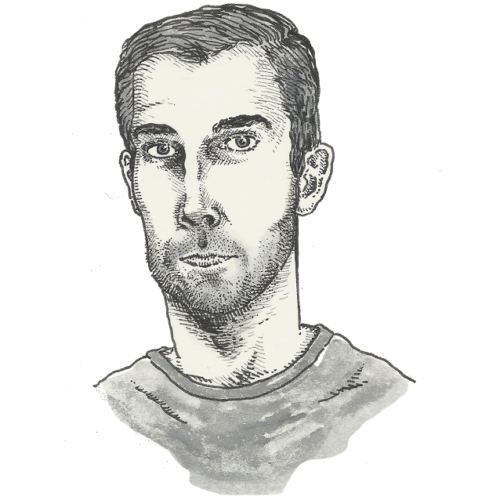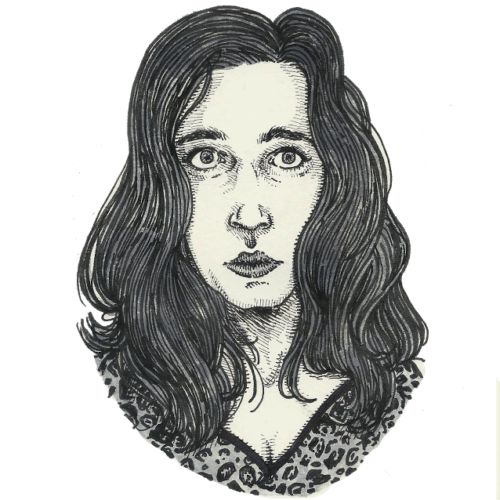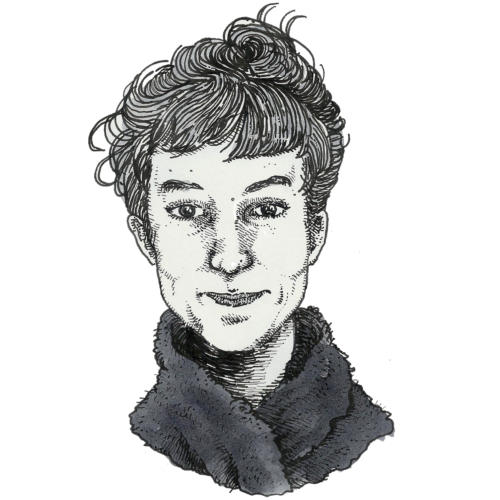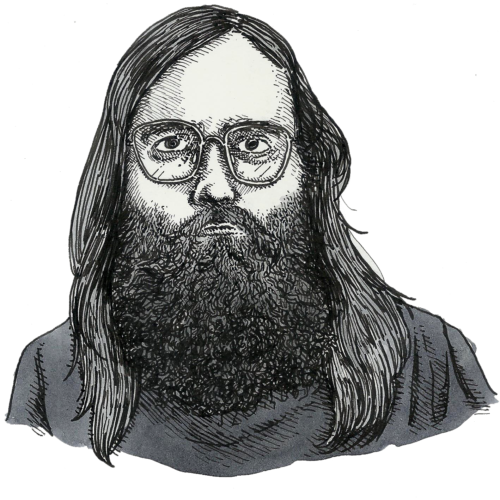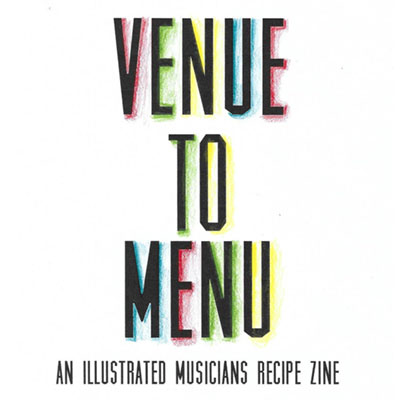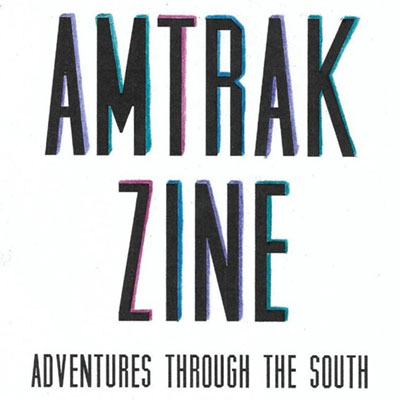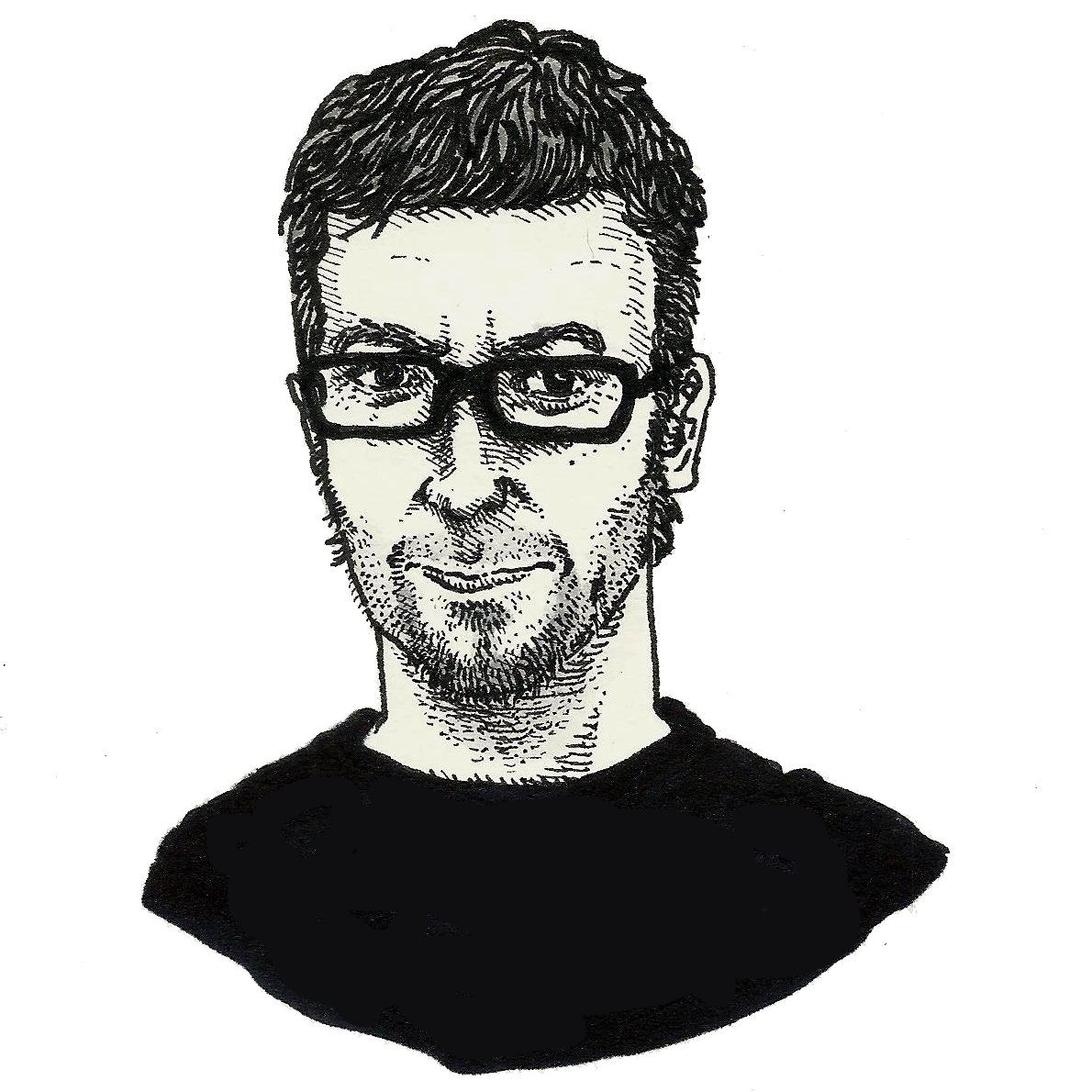
Illustration by Fabio Vermelho
Trace Ramsey is a recipient of the 2015 Ella Fountain Pratt Emerging Artists Award in Literature, a 2015 contributor in non-fiction at the Bread Loaf Writers’ Conference, and winner of the 2016 Alex Albright Creative Nonfiction Prize from the North Carolina Literary Review. His recent publications include essays in At Length Magazine, Hippocampus Magazine, concīs and I Don’t Know How to Help You, a compilation zine from Pioneers Press. In addition to his long running zine series Quitter, Trace is writing a memoir-in-essays, Carrying Capacity, and a novel, The Ornithologists. Trace lives in Durham, N.C., with his partner and two children. Trace’s website is www.goodlucknotdying.com. You can purchase a number of Trace’s work here.
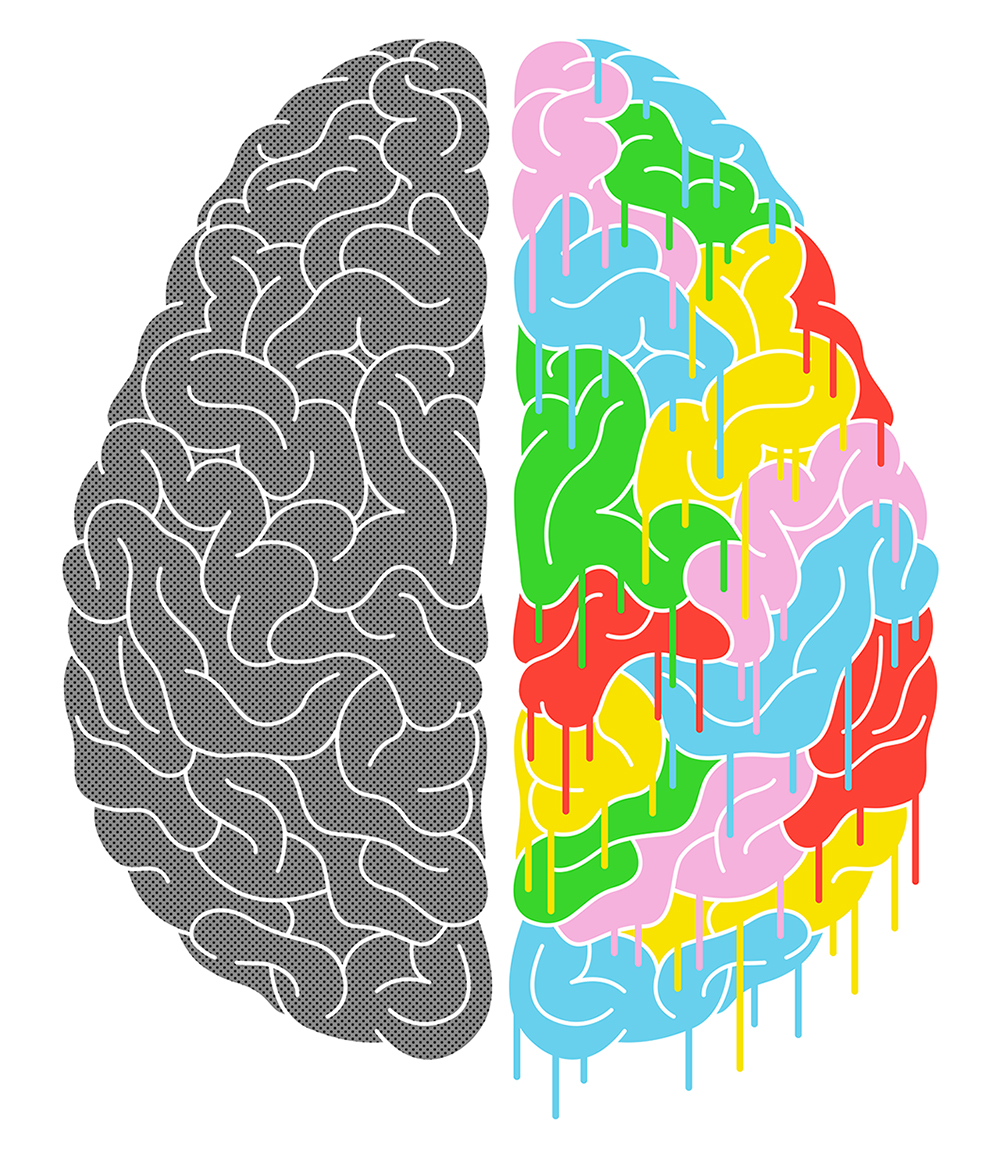
1. Do you actively do anything to keep your brain healthy, and if so what?
I read a lot. I also keep adding to my list of birds I can identify by song.
2. What or who mentally stimulates your growth the most?
I think watching my children discover things about themselves and seeing how they interact with the natural world are my main stimulants. The same is true as far as my writing is concerned; every memory I can harvest from childhood by watching and interacting with my own children is incredibly valuable. My whole style of writing is based on relating my past to my current life. That can only get deeper as the kids age.
3.If you could add or take away anything from your brain what would it be?
I would get rid of the pieces that control addiction, depression, and anxiety. I don’t enjoy living with all of those parts, so I know I could live without them.
Frontal Lobe
4. Are you more emotion or reason based when making decisions?
Depending on the situation, I have become more of an emotional decision maker, mostly in the matters of people who have done me or my family wrong in some way. Otherwise I am very cautious and deliberate, churning my decisions over and over until I am just about out of time to make that decision.
5. In what situations have you learned the most about yourself?
During the birth of my kids, after making the decision to move far from home, while replacing an alternator in my truck.
6. Do you think you have to learn good judgement? (Are people inherently self-destructive?)
I think we have to learn it to some degree, mainly through pushing our boundaries when we are very young. As kids we can watch how our decisions bring out reactions in the people around us and evolve accordingly. I can see it in my children. Personally, I think I am generally self-destructive, primarily because of addiction. I had to learn how to cope with the fact that I will always be an addict, I can’t return to alcohol or whatever and expect that it would go well. I still haven’t been able to write about it. I don’t know how far away from it I need to be. But that is way off track from the question.
7. Do you have any daily or annual rituals? Are they personal to you or your family or are they related to your culture or religion?
Religion is not for me. We do not celebrate any holidays other than our birthdays. And Halloween. I do have rituals though – hug my partner and children every morning and evening, drink coffee every morning, take and post at least one photo a day (which I number) on Instagram. I also like to eat cereal or granola late at night.
8. If you could live inside of a book, which one would it be?
I would like to poke around in The Left Hand of Darkness for a bit.
9. Is it more important for you to speak or to be heard?
To be heard. I am not a talker, but I can write.
10. Do you think a time exists that is easiest to create? For instance, do you strike the muse or does the muse strike you?
I have to strike the muse. I work several very long days and late nights in a warehouse during the week. Our youngest child likes to get up at 5:30 in the morning after waking up several times in the night to breastfeed. Around the house, there is always something or someone that needs to be tended to. There just isn’t enough time to sit down and focus on a sustained amount of writing. So I take whatever I can get. I write on my hand a lot. I have the Evernote app on my phone for quick notes, and I have notebooks everywhere so that I don’t have to hunt for something to jot an idea or phrase down in. I think of things when I am in the shower and I have to rush to finish washing in order to get out to write it all down. Or I will be just about to fall asleep when something comes to me. I know I won’t remember it in the morning, so I have to creep out of the bedroom at 2:00 a.m. without waking anyone up (the four of us sleep in one bedroom) to write myself a note. But a lot of the time when I could be writing or doing layout or messing around with photos, I just end up reading. It isn’t a bad way to spend my bit of downtime, but there is a gnawing that I should be at least revising something I have written.
11. Do you have an emotional state that you find it easier to create in?
I have to be up for it. If I am in a trough of depression, I don’t give a fuck about creating and don’t give a fuck if I ever create anything ever again. I hate everything I have ever made. When I get out of the trough, I can get back to it and see the promise of creating again.
12. Do you think you have to have an elevated ego to be an artist?
I can see this either way. I think maybe folks see self-promotion as ego driven, but I see it more as survival. It goes back the question about being heard. On the other hand, if you are really working hard at your craft, then you are dealing with massive amounts of rejection and critique and people ignoring you. You need to have a durable ego to deal with that every day.
Parietal Lobe
13. What smells do you most associate with your childhood?
Cut grass, beer, cigarettes, plowed soil.
14. If you could only live on five ingredients for the rest of the life, what would they be?
Coffee, bread, peanut butter, almond vanilla granola, cheese.
15. Do you have a place you go to, either physically or mentally, where you feel the most at peace?
I go (mentally) to a very specific place in a very specific forest at a very specific time in my life. It is a massive downed beech tree that spanned a small stream in Pennsylvania called White Oak Run. The cabin I lived in was right there on the stream. It was 1997. I had just graduated from college in Western New York, moved to the coast of North Carolina (where I knew exactly one person), took a shit job ripping off old roofs of coal burning power plants, and just decided that I wanted to be an ornithologist. I applied to a bunch of birding gigs throughout the US and ended up working on a study of the Louisiana Waterthrush just south of Pittsburg. That job and that place have informed so much of my worldview and influenced so much of my writing that I can’t believe that I was only there for four months. It was like I sucked that whole place into this dense piece of matter made out of solitude and birdsong and distance and stuck that piece of matter right where my guts connect with my ribcage. That is where I feel it and where I go.
16. Do you think that people need some form of discomfort to make art?
I think making art is uncomfortable to begin with. You are making something that you want others to connect with and understand on whatever level you want them to understand, and the odds of that happening are really slim. As far as the conventional forms of discomfort like poverty, substance abuse, bad breakups, depression, and all that, I can’t really answer because I don’t personally know the alternative. If I grew up rich and could have one drink and stop and have never been cheated on and had perfect brain chemicals, I’m not sure what my writing would look like or if I would even be driven to write. Living with or through discomfort gives me some amount of precision when I chose my words. It helps me make the reader really work for it no matter how much or how briefly it might hollow them out to do so.
17. Are you more motivated by the promise of reward or the threat of punishment?
Reward. And I need to do a much better job of practicing that in my day to day life, especially in my interactions with my kids.
18. How much does your conscience/morals come into play when making decisions?
I’m not a religious person, but I know I have a firm platform of personal morals and beliefs that I stand on. If you aren’t at least subconsciously asking if a decision you are about to make is going to harm someone else, then maybe you shouldn’t be in charge of making that decision. I’m looking at you cops and politicians.
19. Do you ever experience your emotions in physical ways? If so, how?
Depression makes me physically ill, like I swallowed rocks or glass and then got punched in the exact spot where that debris settled in my insides. It is exhausting as well. If I tell my partner I am not feeling well, they immediately know what I mean.
20. What is your least favourite physical sensation?
Being in the extremes of temperature. I hate shivering and I hate sweating just because it is hot out and not due to physical exertion.
Temporal Lobe
21. Do you think a person has to understand art in order to be able to appreciate it?
Yes and no. For example, I don’t understand much about quantum mechanics, but I can appreciate everything behind the theories and applications. Understanding art can be a bit different. I don’t think there is much to be objective about in art, just like an axiom is not made whole by subjectivity. That may bother the quantum philosophers of the world who believe that there is nothing that is not subjective, even calculus or physics, simply because everything in those fields comes from the observations of a single species. Or the art philosophers who believe that you must have objectivity to affirm subjective viewing of art. I find it hard to argue that the Second Law of Thermodynamics has any sort of subjectivity to it or that a person can view a Rothko or read Ursula LeGuin with cold objectivity.
22. What is your earliest memory?
Laying on a carpet, moving a small plate of some sort underneath a coffee table. My parents are there and the television is on.
23. Do you expect happiness in your life?
No, but I don’t really expect anything in life except to be disappointed. That is pretty gloomy, but that is just how I see it. From growing up in an abusive home, I have to toil through my past (with the help of a therapist) in order to determine what it even means for me to be happy. I honestly do not know yet what it is supposed to feel like. That would be challenging, to expect happiness but not know, truly, what happiness is.
24. What flaws do you think you have when it comes to communicating with other people?
I am a horrible communicator. Everyone I work with can verify that. I don’t usually enjoy talking outside of a ring of very specific people. I can do it, but it takes everything out of me. I also tend to bother people via email or Facebook if I don’t get an answer soon enough. I know that probably really fucking bugs them, but I can’t help it. Once I get an idea in my head and someone else is part of it, I need my questions answered and I need them answered on whatever bizarre time frame I invent for myself.
25. What do you think your ex partners would say the hardest thing about loving you was?
Not knowing what I was thinking.
Occipital Lobe
26. What’s the most unbelievable thing you’ve ever seen?
A baby being born. A Whip-poor-will’s open mouth. A dumpster full of doughnuts. A barn roof full of vultures with their wings outstretched to dry in the sun.
